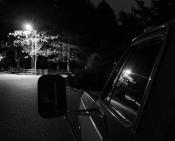under the big black sun: a fable
The intended region is uncharted territory, north of the city along 165. Off the map as far as Mac is concerned. The highway, re-rerouted into a straight bypass during the sixties, sits raised upon a slight levee, broad shoulders sloping down toward bottom lands which revert to swamps after any particular rain.
He wouldn’t be doing this, if he didn’t have to. And what makes him have to, he isn’t sure.
The concrete shoulders have rough braids that send otherworldly machine-gun warnings if the car drifts even a little. He drives slowly, traffic whizzing around the Fury.
Amidst garden nurseries and veterinarians and bottle shops he searches, remembering a dim intuition to turn left at a TV repair place—all of this against a gloomy wooded backdrop. Vaguely disappointed, he comes to the correct street. A residential area squats beyond a raised railroad track. For a few moments he deliberates, then lets the high idle of the Fury pull him on. Descending from the tracks he encounters few lights; all street names and numbers are murky and indefinite.
Many years have passed since he was here, and summoning instinct, he turns strategically, recalling this neighborhood too had once been a swamp bottom, even now draped with tourist-attraction scenic moss.
There are no sidewalks here and the pavement narrows and deteriorates as if in direct correspondence to houses becoming smaller and simpler, regressing toward still-plowed fields. When he finally reaches the end of the street (beyond which lies acres of fallow crop-rows and tall black hardwood-stands), there sits a small yellow cottage devoid of any decorative trim whatsoever.
The peach-colored aging Celica parked outside the carport assures Mac this is the place. John lied. She never moved. There's another car— now, a newer Toyota with a dent in the back fender.
Cutting his lights, he drifts along the soft-angled curb, parking opposite and two houses up. He makes no immediate move. Night comes sooner here among the thick trees and he watches the light fade from the sky as if it were being dimmed by an invisible hand upon a switch.
Beside the driveway to the house sits a single streetlamp. He remains and watches a small figure at play under the light.
He decides what she is tracing is her own shadow outline in a patch of dirt where the grass has failed. A nearby small puddle refracts the streetlight, the image shattering as the child tips her finger into it. The street is quiet, forbidding.
The thick treetrunks and moss behind the house are hard to see through. Within the gray are black spaces, entirely impenetrable. He cannot imagine what it would be like to wake up and look out a window to such terror.
Time.
When he shuts the car door the child notices him and speaks with an impossible familiarity: "My baby brother is sick." "He is." Mac crosses the street with studied laxness, hands in pockets. He looks about the house as he approaches, stopping several feet away from her. "What's wrong with him." "He swallowed a pill."
Ceiling lights betray two active areas in the house: a rear bedroom and the kitchen, visible at the end of the carport. The child talks on, not even gazing up to him now. A smell drifts from the woods behind, a captive mud odor, rising on a breeze that holds yet a little of the day's heat.
He is standing at post, speaking softly in response to the child, when there is an event like an explosion and a woman is coming fast from the sprung-open kitchen screen door, wiping her hands:
"Don't touch her!" Walking very quickly but still walking she throws the drying-cloth on the hood of the Celica, flesh seeming to vibrate over brittle bones. In one motion she advances and snatches the child up. Her face stops quite close to his, blotched as from heat, archaically familiar.
She glares at him intensely, her speech between a chant and a yell: "Don't you dare come in this house, don't come to the door, don't cross the driveway, don’t ever, don't, don't, don't." Her face, thin and tight, is like a pasted layer of paper on a plastic skull.
The sound of what she’s yelling fills the air with the pressure of a climatic occurrence. Mac somehow manages to feel calm, peripheral, an observer rather than the object of this rage. Longsuffering moments pass. Somewhere in the frantic monologue she calls him by name. Mac would begin to speak but he gets no chance.
And then she stops suddenly. As if timed.
Her body shakes visibly, stepping neither forward nor backward but defensively sideways toward the blasted-open door, sputtering, an antic thin figure harried by one last detail.
Mac stands where he has been since encountering the child, gazing at the house. The trees around him loom huge, dominant.
She latches the screen door and remains outlined in shadow, watching Mac until he drives off with no further attempts to visit his sister.


